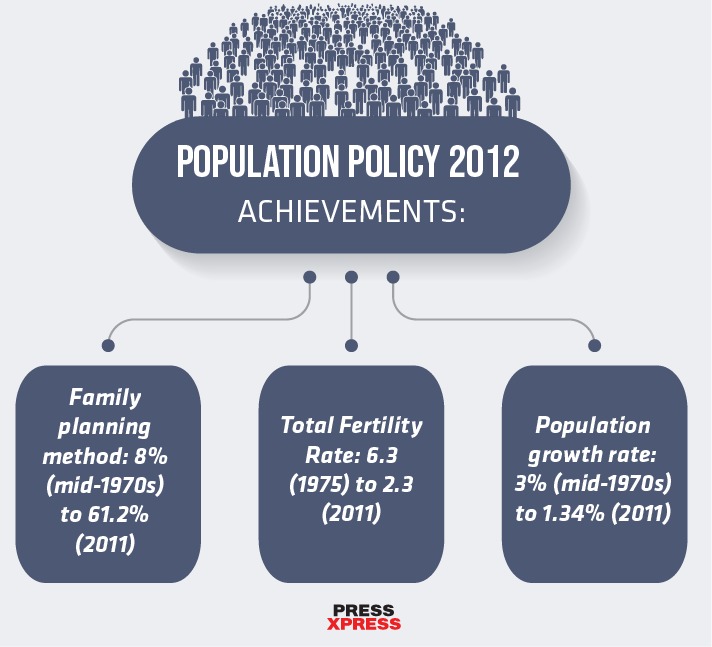- Symbolic shift from stringent population control to inclusive and rights-based measures.
- New objectives include women’s empowerment, reproductive health, and poverty eradication
- Integration of population control and family planning initiatives for social reform and progress.
The population boom in Bangladesh is highly a concerned issue. Whenever we go outside in the city, at every step, we get almost touched by another. This brings a caution that without taking a proper policy of population control, at one stage, the country will not be in the capacity to extend facilities to all for a better economic life and this might lead to disorder.
You can also read: Sheikh Hasina: The Leader of Trust
Counting the urgency of this very situation, in a significant announcement, Prime Minister Sheikh Hasina declared the government’s decision to update the Population Policy 2012, with a focused aim of harnessing demographic dividends through skill development and vocational education. Speaking at the inauguration of the “ICPD30 Global Dialogue on Demographic Diversity and Sustainable Development,” Prime Minister Hasina outlined the pivotal role of the updated policy in transforming the population into a valuable human resource.
“Very recently, we have decided to update the Population Policy 2012. In the new policy, the Demographic Dividend, which will continue from 2041 to 2061, is being emphasized to transform the population into human resources through skill development and advancement, emphasizing vocational education,”
– Prime Minister Sheikh Hasina

Leveraging the Demographic Dividend
The prime minister made these remarks while inaugurating a two-day event titled “ICPD30 Global Dialogue on Demographic Diversity and Sustainable Development”. The event creates a platform to discuss the challenges and explore the opportunities of the world’s shifting demographics. The program has been organized by Bangladesh, Bulgaria, and Japan, together with UNFPA.

At the event, Prime Minister Hasina highlighted the importance of the demographic dividend, slated to continue from 2041 to 2061, as a key driver in the transformation process. Under the updated policy, concerted efforts will be made to empower the populace through skill enhancement and vocational training, thereby capitalizing on the demographic window for sustainable development.

Shifting Focus: From Control to Management
Unlike previous iterations, which primarily focused on population control measures, the revised policy adopts a more nuanced approach by shifting its focus toward effective population management. Key objectives include ensuring access to vocational education, combating child marriage and adolescent pregnancy, promoting women’s education for sustainable reproductive health, empowering women, eradicating discrimination and poverty, and addressing the needs of the aging population.
In a symbolic move, the government has reverted to the slogan “Be it a boy or a girl, two children are enough,” signaling a departure from stringent population control measures towards a more inclusive and rights-based approach.
What are the objectives of the revised population policy?
The revised Population Policy of Bangladesh has the following key objectives:
- Foster vocational education among the youth to cultivate a skilled workforce.
- Combat child marriage and adolescent pregnancy.
- Promote women’s education for sustainable reproductive health.
- Empower women across all sectors.
- Combat discrimination and poverty.
- Address the aging population’s needs to achieve a secondary demographic dividend.
- Lower the total fertility rate (TFR).
- Increase the utilization rate of family planning services.
- Attain a Net Reproductive Rate (NRR) of 1.
- Ensure safe motherhood and reduce maternal and infant mortality rates.
- Enhance healthcare services for mothers and children.
- Ensure accessibility of various family planning methods.
- Promote gender equity and women’s empowerment.
- Develop the population into a valuable human resource in collaboration with relevant ministries.
- Facilitate easy access to information on reproductive health.

Population Policy 2012
The outline of the population policy underscored the integration of population control and family planning initiatives as essential components of social reform and national progress. These efforts aimed at reducing family size to promote maternal and child health, family welfare, and an elevated standard of living. Key provisions included decentralization of financial authority, bolstering monitoring systems, and fortifying the organizational framework of population control and family planning endeavors.
The results of these efforts were remarkable, with the percentage of family planning method utilization surging from 8% in the mid-1970s to an impressive 61.2% in 2011. Concurrently, the Total Fertility Rate (TFR) plummeted from 6.3 in 1975 to 2.3 in 2011, while the population growth rate dwindled from 3% in the mid-1970s to 1.34% in 2011. However, these achievements were deemed insufficient in ameliorating living standards due to persistent challenges.
In light of these challenges, the primary objective of the Bangladesh Population Policy 2004 was to attain a Net Reproductive Rate (NRR) of 1 by 2010, aiming for population stability by 2060. However, the original target of achieving NRR = 1 by 2010 remained unrealized, necessitating an update to expedite related activities.
Furthermore, aligning family planning strategies with international frameworks such as the Millennium Development Goals (MDGs), the International Conference on Population and Development (ICPD), the Convention on the Elimination of All Forms of Discrimination Against Women (CEDAW), and the Sixth Five Year Plan is imperative.
These considerations were pivotal in formulating the Revised Population Policy 2012, reflecting a comprehensive approach towards addressing demographic challenges and fostering sustainable development.


